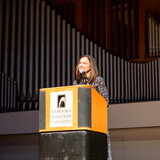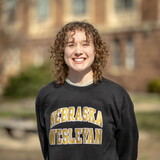Four years ago this month Caty Reed sat at her high school graduation and listened to a speaker tell her and her fellow classmates that they could change the world.
It was all very cliché, she said, but she could sort of relate. After all she was headed to Nebraska Wesleyan University to study nursing, and in that line of work she could certainly have an impact on her future patients.
A couple months later Reed sat through NWU’s Matriculation Convocation, the official kickoff to a new student’s academic career. The convocation theme: change.
Soon after, Reed heard communication studies professor Patty Hawk speak at a Liberal Arts Seminar. Reed admits she didn’t know anything about Hawk at the time, but Reed was intrigued by Hawk’s enthusiasm.
Reed eventually took one of Hawk’s communication courses, canceled her nursing career plans, and decided on a major in communication studies.
The student from St. Edward, Neb., was starting to understand change.
“I didn’t know this would change my world and change what I wanted to do,” Reed said of her upper-level communications course Communicating Through Dialogue.
The course was added to NWU’s curriculum three years ago. The course has attracted students from a variety of academic areas.
“The purpose of the course is to help students develop comfort and confidence as facilitators and participants,” said Hawk. “I was hoping students would embrace dialogic communication as a way to engage the world.”
The course’s culminating project requires students to engage in a topic or dilemma by bringing stakeholders together in dialogue.
Reed partnered with fellow communication studies major Carol Ready and together they developed a proposal to use dialogue for improving the racial climate on campus.
Their proposal addressed Midwestern Nebraska kindness and how Nebraska Wesleyan’s campus seems like a remarkably warm and hospitable place.
“But even a kind and hospitable campus experiences racism,” Reed wrote in her proposal.
Their dialogue proposed bringing together 20 participants of students, professors and administrators. Reed and Ready recognized they would be dealing with a difficult topic, but they also learned in their dialogue course that building interpersonal relationships, focusing on people’s experiences, and understanding differing perspectives would be key to addressing racism.
Their proposal was the capstone to the class, but their work was not done.
Last fall Reed put the proposal to practice, titled it “Nebraska Wesleyan University Race Dialogues”, secured funding through the university’s Wolf Fund for Diversity, and invited a group of faculty and staff to join her in dialogue.
Participants in the first dialogue were asked: how do you know if racial bias is an issue on campus; in what ways are we limited by being a predominately white campus; and what can you do about it?
“From a dialogue perspective, it was beautiful,” said Reed. “People started out a little timid but by the end of the night they truly left as allies.”
“It felt warm and inviting,” added Candice Howell, assistant to the provost for student success and diversity. “No one felt judged for their opinions.”
Reed wanted the conversation to continue. This spring she invited more members of the campus community to join the original dialogue group. The group did more talking and more listening.
“You know it is going well when the facilitator doesn’t have to do much talking,” Reed said following the second dialogue. “As you could see, I didn’t say much.”
Reed’s final question to the group: how should we expand the circle? Next fall, more will be added to the conversation. Carol Ready — who first teamed with Reed on the class capstone project — will lead the effort to make sure the campus conversation continues.
“Sustained dialogue is useful for exploring racial issues,” said Reed. “You feel heard and you listen without judgment.”
“Racism happens in many organizations across the world. It’s in our history,” said Hawk. “It’s best to be proactive rather than reactive so that when they happen, we’ll have had relationships already formed. We’ll be able to move past discussion and debate and create something together so we can take action.”
The experience has been life-changing for Reed. The student who came here to study nursing now hopes to make a career out of dialogue and facilitation. She eventually wants to become a college communication professor.
“I’m so in love with it,” said Reed. “Dialogue flows through my veins as free as my blood does.”










